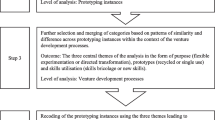Abstract
Kirzner's (1973) theory of entrepreneurship emphasizes the equilibrating role of entrepreneurship. When the market is not in equilibrium, profit opportunities exist, and entrepreneurs discover and act on these profit opportunities to equilibrate the market. Because Kirzner focuses on entrepreneurial actions when profit opportunities exist, and does not describe where they come from, one could imagine a fixed stock of profit opportunities that get used up as entrepreneurs discover them. But new profit opportunities are being created constantly. A taxonomy of the origins of entrepreneurial opportunities includes factors that disequilibrate the market, factors that enhance production possibilities, and most notably, opportunities created from previous acts of entrepreneurship. Entrepreneurial actions do not use up profit opportunities, but create them, and the critical role of entrepreneurship in the creation of new profit opportunities is emphasized. This line of reasoning leads directly to policy implications regarding the economic environment conducive to entrepreneurial discovery and the role of government in research and development. This paper enhances Kirzner's theory of entrepreneurship by illustrating how entrepreneurship enlarges the stock of future entrepreneurial opportunities, and points to entrepreneurship as the engine of economic progress.
Similar content being viewed by others
References
Alchian, A. A. and Demsetz, H. (1972) “Production, Information Costs, and Economic Organization.” American Economic Review, 62(5): 777–795.
Barro, R. J. (1996) “Democracy and Growth.” Journal of Economic Growth, 1(1): 1–27.
Boudreaux, D. J. and Holcombe, R. G. (1989) “The Coasian and Knightian Theories of the Firm.” Managerial and Decision Economics, 10: 147–154.
Bygrave, W. and Minniti, M. (2000) “The Social Dynamics of Entrepreneurship.” Entrepreneurship: Theory and Practice, 24(2): 1–12.
Coase, R. H. (1937) “The Nature of the Firm.” Economica, 4: 386–405.
Ferguson, C. E. (1969) Microeconomic Theory, Rev. ed. Homewood, Illinois: Richard D. Irwin.
Gwartney, J., Lawson, R., and Block, W. (1996) Economic Freedom of the World: 1975-1995. Vancouver: Fraser Institute.
Gwartney, J., Lawson, R., and Holcombe, R. (1999) “Economic Freedom and the Environment for Economic Growth.” Journal of Institutional and Theoretical Economics, 155(4): 643–663.
Harper, D. A. (1996) Entrepreneurship and the Market Process: An Inquiry into the Growth of Knowledge. London: Routledge.
Hayek, F. A. (1945) “The Use of Knowledge in Society.” American Economic Review, 35: 519–530.
Hayek, F. A. (1949) “Economics and Knowledge.” In: Hayek, F. A. (Ed.) Individualism and Economic Order, London: Routledge & Kegan Paul.
Holcombe, R. G. (1997) “A Theory of the Theory of Public Goods.” Review of Austrian Economics, 10(1): 1–22.
Holcombe, R. G. (1998) “Entrepreneurship and Economic Growth.” Quarterly Review of Austrian Economics, 1(2): 45–62.
Holcombe, R. G. (1999) “Equilibrium Versus the Invisible Hand.” Review of Austrian Economics, 12(2): 227–243.
Kirzner, I. M. (1963) Market Theory and the Price System. Princeton: Van Nostrand.
Kirzner, I. M. (1973) Competition and Entrepreneurship. Chicago: University of Chicago Press.
Kirzner, I. M. (1979) Perception, Opportunity, and Profit: Studies in the Theory of Entrepreneurship. Chicago: University of Chicago Press.
Kirzner, I. M. (1985) Discovery and the Capitalist Process. Chicago: University of Chicago Press.
Kirzner, I. M. (1999) “Creativity and/or Alertness: A Reconsideration of the Schumpeterian Entrepreneur.” Review of Austrian Economics, 11: 5–17.
Kreuger, A. O. (1993) Political Economy of Policy Reform in Developing Countries. Cambridge: MIT Press.
Lewin, P. (1997) “Hayekian Equilibrium and Change.” Journal of Economic Methodology, 4(2): 245–266.
Lucas, R. E. Jr. (1988) “On the Mechanics of Economic Development.” Journal of Monetary Economics, 22(1): 3–42.
Olson, M. Jr. (1996) “Big Bills Left on the Sidewalk: Why Some Nations are Rich, Others Poor.” Journal of Economic Perspectives, 10(2): 3–24.
Romer, P. M. (1990) “Endogenous Technological Change.” Journal of Political Economy, 98: S71–S102.
Schiller, B. R. and Crewson, P. E. (1997) “Entrepreneurial Origins: A Longitudinal Inquiry.” Economic Inquiry, 35(3): 523–531.
Schumpeter, J. A. (1934) The Theory of Economic Development. Cambridge: Harvard University Press.
Scully, G. W. (1988) “The Institutional Framework and Economic Development.” Journal of Political Economy, 96(3): 652–662.
Scully, G. W. (1992) Constitutional Environments and Economic Growth. Princeton: Princeton University Press.
Smith, A. [1937 (1776)] An Inquiry Into the Nature and Causes of the Wealth of Nations. New York: Modern Library.
Stigler, G. J. and Becker, G. S. (1977) “De Gustibus Non Est Desputandum.” American Economic Review, 67(2): 76–90.
Williamson, O. E. (1990) “A Comparison of Alternative Approaches to Economic Methodology.” Journal of Institutional and Theoretical Economics, 146(1): 61–71.
Author information
Authors and Affiliations
Rights and permissions
About this article
Cite this article
Holcombe, R.G. The Origins of Entrepreneurial Opportunities. The Review of Austrian Economics 16, 25–43 (2003). https://doi.org/10.1023/A:1022953123111
Issue Date:
DOI: https://doi.org/10.1023/A:1022953123111




